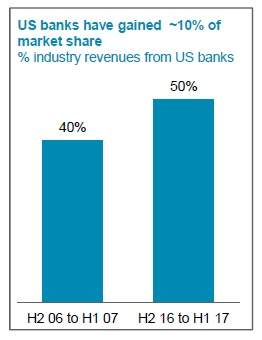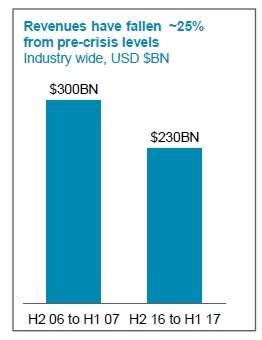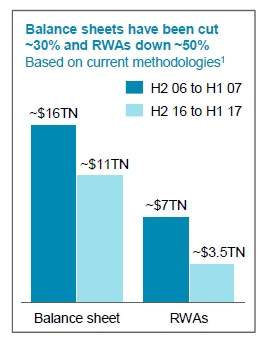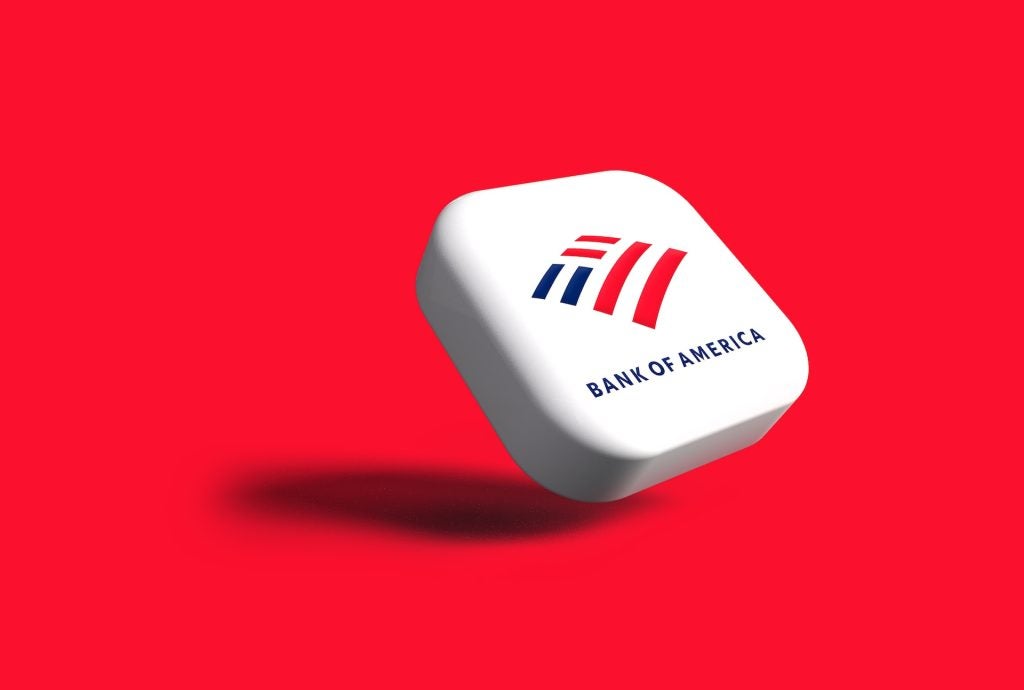
August 9 is seen as the 10-year anniversary of the global financial crisis.
This was the date that French bank BNP Paribas began shutting down investment funds because there were problems in the US securities market. This then lead to a cycle of events that would consume the major banks around the world.
The BBC’s business editor, Simon Jack, described this moment as the “first tremor of a full-blown financial earthquake”.
3 charts that show how things have changed since 2007
According to research by consultancy Oliver Wyman, much has changed in the global financial market over the past decade.
- US banks have grown their market share up 10 percent, from what it was 10 years ago

How well do you really know your competitors?
Access the most comprehensive Company Profiles on the market, powered by GlobalData. Save hours of research. Gain competitive edge.

Thank you!
Your download email will arrive shortly
Not ready to buy yet? Download a free sample
We are confident about the unique quality of our Company Profiles. However, we want you to make the most beneficial decision for your business, so we offer a free sample that you can download by submitting the below form
By GlobalData2. However, revenues have fallen 25 percent from pre-crisis levels, from $300bn before the crash to $230bn now

3. Balance sheets have been cut down too, by 30 percent, from $16trn to $11trn

Source for charts: Oliver Wyman
Christian Edelmann, global head of corporate and institutional banking and wealth and asset management at Oliver Wyman, said: “The capital markets industry has radically reshaped itself since the crisis began 10 years ago. Banks have enhanced their risk management, met new regulatory requirements and cut costs to restore profitability. The next 10 years will see similarly radical changes.”
How likely is it that another crash will happen?
Though the global economy is in a better position than it was a decade ago, economists are warning that it could easily turn upside down again.
Alastair Darling, the UK’s chancellor in 2007, said that regulators must remain vigilant about the risks to the economy to prevent a crisis happening again.
He told BBC Radio 4’s Today programme: The lesson from 10 years ago is that something that can start apparently as a small ripple in the water can become mountainous seas very quickly.”
As well, he said the rising level of consumer debt in the economy should “raise alarm bells”.
Over in the US, however, there is more confidence in the market. Earlier this year, the Federal Reserve chair Janet Yellen said it was unlikely that there would be another financial crisis in our lifetime.
After carrying out stress tests on the US banks, Yellen said they were very much stronger.
“I think the system is much safer and much sounder. We are doing a lot more to try to look for financial stability risks that may not be immediately apparent but to look in corners of the financial system that are not subject to regulation, outside those areas in order to try to detect threats to financial stability that may be emerging,” she said.
GlobalData insights
Assessing the global financial crisis’s impact on the private banking and wealth management sector, Nicole Douglas, wealth management analyst at GlobalData, says much has changed by way of financial regulation since then, but there is still progress to be made to ensure a crisis of this size does not become cyclical.
Douglas comments: “Financial regulators should continue to remain vigilant and equip financial services providers with the resources and capabilities needed to ensure sound and thorough decisions are made on behalf of clients and their investments.”
As reported in GlobalData’s Wealth in the UK: Competitive Dynamics 2016, the stakes are high when a company fails to comply.
In 2015 the FCA imposed the largest company fine of its history (include that of its predecessor the FSA) on Barclays for £72.1m for failing to comply with due diligence regulation and minimise risk related to a transaction executed on behalf of UHNW clients in 2011 and 2012.
Looking ahead, Douglas warns that private banks and wealth managers will do well to ensure their policies and decisions fall within the regulations set about by the likes of the FCA.
Bartosz Golba, head of content, (interim), wealth management at GlobalData, says the financial crisis forced many banks to slim their operations and forfeit global expansion plans.
Golba explains: “As private banking and wealth management units traditionally have higher cost / revenue ratios than other divisions of universal banks, they were often first to be cut.
“HSBC Private Bank is one competitor that used to pursue an active M&A strategy, but is now more focused after selling some portfolio clients in Switzerland, Monaco, or closing operations for instance in Brazil.”
Interestingly, Golba says the above trend has been beneficial to smaller, boutique private banks, which he says have not been affected particularly by the crisis.
Golba says that boutique private banks’ businesses have been more healthy and now they are able to buy operations or client portfolios that giants are divesting.
How has the global financial crisis impacted the international private banking and wealth management sector over the last decade? Share your view.
Share your view with Private Banker International editor Ronan McCaughey by emailing ronan.mccaughey@verdict.co.uk







